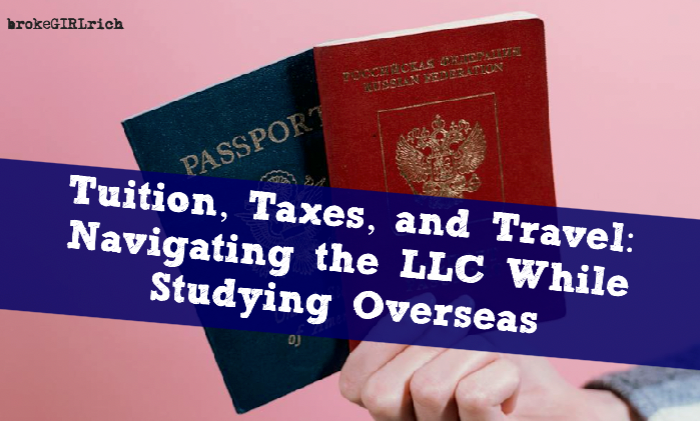
Tuition, Taxes, and Travel: Navigating the LLC While Studying Overseas
The Lifetime Learning Credit (LLC) offers a significant tax advantage for U.S. taxpayers engaged in higher education, easing the financial burden of tuition and other eligible costs. However, American students studying abroad face specific hurdles when trying to claim this benefit. This article delves into the Lifetime Learning Credit, its eligibility requirements, and the challenges U.S. students in foreign institutions may encounter.
Understanding the Lifetime Learning Credit (LLC)
The Lifetime Learning Credit is a federal tax credit aimed at reducing the cost of higher education for qualified students. Unlike other education-related credits such as the American Opportunity Tax Credit (AOTC), which is exclusive to undergraduate students, the LLC is available for a wider array of educational pursuits, including undergraduate, graduate, and professional courses. This makes it especially beneficial for those seeking to enhance their skills, switch careers, or take extra classes.
Key Features of the LLC
– Credit Amount: The LLC offers a credit of up to $2,000 per tax return, calculated as 20% of the first $10,000 in eligible education expenses.
– No Limit on Years: In contrast to the AOTC, which is limited to four years per student, the LLC can be claimed for an unlimited duration.
– Eligible Expenses: The credit includes tuition and fees necessary for enrollment but excludes living costs, travel expenses, and health insurance.
– Income Limitations: The credit starts to phase out with a modified adjusted gross income (MAGI) of $80,000 for single filers and $160,000 for married couples filing jointly (as of the 2023 tax year).
– Refundability: Unlike the AOTC, which permits partial refunds, the LLC is non-refundable; it can reduce tax liability to zero but won’t generate a refund beyond the owed tax.
Challenges for U.S. Students Studying Overseas
While the LLC is intended to aid students at qualified institutions, American students attending overseas universities may face significant obstacles when attempting to claim the credit. Below are some primary challenges:
1. Foreign Institution Eligibility
To claim the LLC, the educational institution must be classified as an Eligible Educational Institution (EEI), which means it needs recognition from the U.S. Department of Education and participation in the Federal Student Aid (FSA) program. A number of international universities do not partake in these programs, disqualifying students from accessing the credit.
This is a personal challenge I am currently navigating—after thorough research, I discovered that my university does not qualify as an EEI and lacks an EIN (Employer Identification Number). This revelation was incredibly disheartening, particularly after facing a multitude of bureaucratic issues related to finance and administration at my school. While I can’t say I was surprised, it remains a frustrating setback, resulting in the loss of three years’ worth of potential $2,000 tax credits.
Solution: Students should verify if their foreign institution possesses an Employer Identification Number (EIN) and participates in U.S. Department of Education programs prior to assuming eligibility for the LLC.
2. Currency Exchange and Expense Documentation
Foreign universities often issue bills in local currencies, complicating the process of determining the exact amount of qualified expenses in U.S. dollars. The IRS mandates proper documentation for tuition payments, and varying exchange rates can add layers of difficulty to these calculations.
Solution: Students should keep comprehensive records, including receipts, bank statements, and the exchange rate applicable on the date of payment, to ensure accurate reporting.
3. Tax Residency and Filing Complications
Many American students abroad may find it difficult to ascertain their tax residency status. The IRS requires U.S. citizens to report global income, and residing overseas can introduce additional tax considerations like foreign income exclusions or tax treaty agreements.
Solution: Students should seek advice from a tax professional to understand how their residency status affects eligibility for the LLC and other potential tax benefits.
4. Lack of Form 1098-T from Foreign Institutions
In the U.S., institutions issue Form 1098-T (Tuition Statement) to students, simplifying the claiming process for educational tax credits. However, foreign universities typically are not obligated to provide this form, making it challenging for students to validate their claims.
Solution: Students can still claim the LLC by submitting alternative evidence, such as tuition invoices, bank statements, and proof of payment. However, this could heighten the likelihood of an IRS audit or requests for more information.
Conclusion
The Lifetime Learning Credit is a valuable tax benefit that encourages lifelong learning, yet American students studying abroad must navigate unique challenges to access it. Ensuring the eligibility of foreign institutions, maintaining comprehensive financial records, and understanding tax implications are crucial steps to securing this credit. Given the complexities, consulting a tax professional can help students optimize their educational benefits while adhering to U.S. tax regulations.







